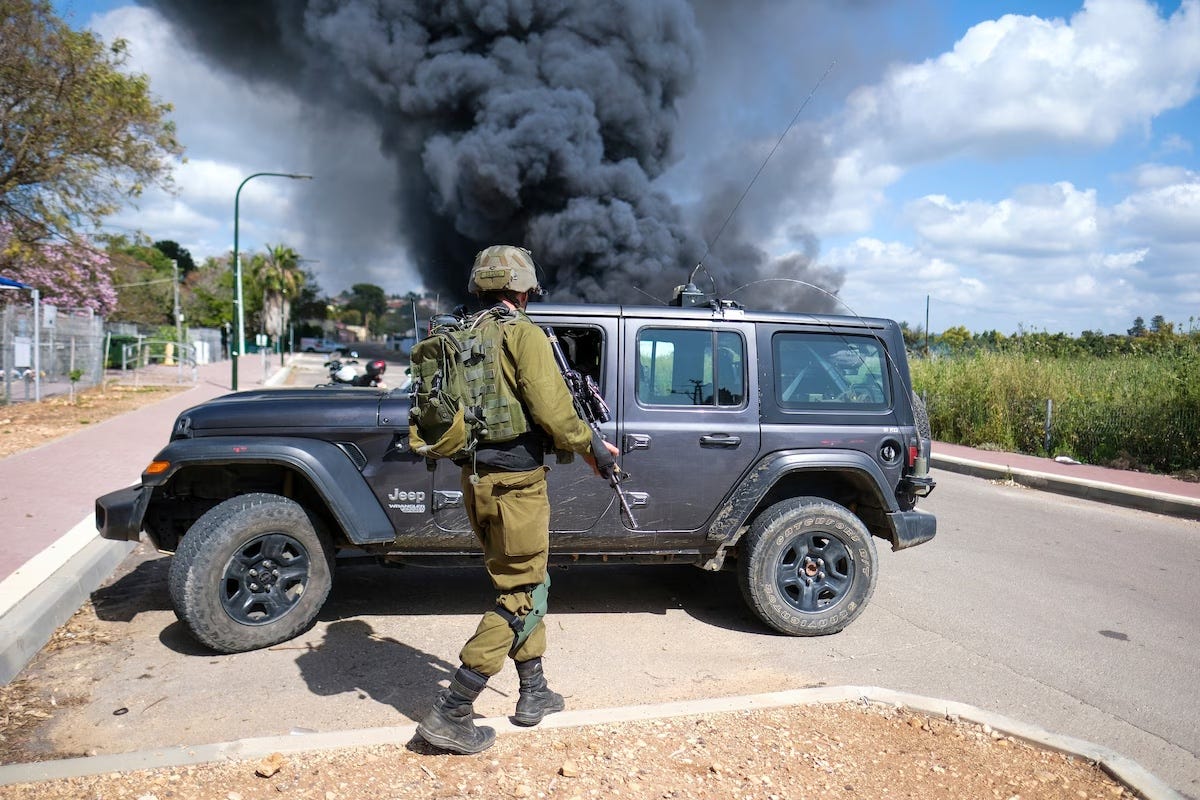US condemns rockets fired at Israel from Lebanon, Gaza

The United States condemned the launching of over 30 rockets from Lebanon into northern Israel on Thursday, and said Israel has every right to defend itself.
The rocket attacks marked the most serious escalation on the Lebanese/Israel border in several years, and comes amid heightened Israel Palestinian tensions in Jerusalem, and growing coordination between Palestinian factions and Lebanese Hezbollah, analysts said.
“We condemn the launch of rockets from Lebanon and Gaza at Israel,” State Department Vedant Patel told journalists at the State Department briefing Thursday (April 6). “Our commitment to Israel’s security is iron clad. We recognize Israel has a legitimate right to defend itself against all forms of aggression.”
“Using Lebanon as a launchpad for rocket attacks against Israel only puts the Lebanese people at risk and increases the potential for further instability in the country,” an NSC spokesperson said.
The rocket barrage into northern Israel came on the second day of the Passover holiday during which many Israelis are vacationing in the north. Some 25 of the rockets were intercepted by air defense systems, and six landed in Israel, an Israeli military spokesman said.
It also comes after Israeli forces raided Al Aqsa mosque in Jerusalem for a second night.
The Israeli Defense Forces said Palestinian factions including Hamas launched the rockets, but that the Lebanese government was responsible for attacks on Israel conducted from its territory.
"The fire from Lebanon is very serious, and it testifies to a multi-front but single-organization, Palestinian-Hamas event,” IDF spokesperson Daniel Hagari said. “We are examining it, but one thing is clear: The state of Lebanon is responsible when [rockets] are fired from it, and we are looking into Iranian involvement."
The rocket attacks “came a day after Hamas leader Ismail Haniyeh arrived in Lebanon for a visit,” AFP reported. “A Hamas source told AFP that Haniyeh had canceled a visit to the southern Lebanese city of Sidon scheduled for Thursday afternoon due to the ‘developments.’”
A source close to Lebanese Hezbollah told Al Arabiya that the Iranian-backed group has “nothing to do with the rocket fire.”
An Israeli defense analyst said there has been growing coordination between Palestinian factions and Lebanese Hezbollah in recent years, that aims to take advantage of flare ups of Israeli Palestinian tensions in Jerusalem and at the holy site of Temple Mount/Al Aqsa mosque, challenging Israel’s ability to retaliate, and at what address, without risking a major escalation.
“The rockets that were launched from Lebanon today are the result of a sequence of events and not just one single event,” former IDF intelligence analyst Danny Citrinowicz wrote in a Twitter thread.
Cooperation between Lebanese Hezbollah and the Palestinian group Hamas has intensified. “Hamas increased its power buildup in Lebanon under [Lebanese Hezbollah] supervision,” Citrinowicz wrote. “Additionally in recent years, [Lebanese Hezbollah] began to emphasize its commitment to the defense of Jerusalem and its support to the Palestinian cause.”
“Hezbollah doesn’t want war, but believes that Israel will know how to contain the current event,” he wrote. “Hamas thinks that it will be possible to retaliate from Lebanon without an Israeli response and thus prevent an unwanted escalation in Gaza.”
For Israel, “the goal is to find a response that will deter but not escalate,” Citrinowicz said.
While backing Israel’s right to defend itself from the rocket attack, the White House urged all sides to deescalate, seemingly in reference to Israeli Palestinian tensions in Jerusalem and the Temple Mount/Al Aqsa.
“We remain extremely concerned by the continuing violence and we urge all sides to avoid further escalation,” an NSC spokesperson said by email.
“As the State Department reiterated just yesterday, we stand firmly for preservation of the historic status quo at holy sites in Jerusalem.”
Though Hezbollah distanced itself from the rocket barrage, it has much control over what Palestinian factions do in southern Lebanon, said Joseph Bahout, with the American University of Beirut’s Issam Fares Institute for Public Policy and International Affairs.
“Also, a Hamas delegation and an Islamic Jihad one were in Beirut lately and met with Nasrallah,” Bahout noted. “But deniability holds.”
The Palestinian factions “operate from camps that are almost autonomous,” Bahout said. The Lebanese “army will probably arrest some militants, for the show.”
**


